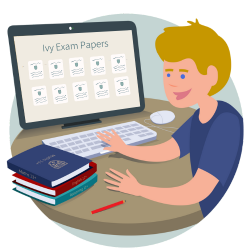Expert Insights
How to prepare for the 11+ GL Assessment
Published 2nd August 2024 by Alastair

How to prepare for the 11+ How to prepare for the 11+ GL Assessment
The 11 Plus Grammar School exam is a vital assessment taken by
many children in the UK as they prepare to enter a selective school. One
of the main providers of this exam is GL Assessment, who administer the
majority of grammar school tests across the country. In this article,
we'll discuss what to expect from the GL 11+ exam.
GL Assessment (Granada Learning) is responsible for writing and administering a high volume of 11-plus tests across the UK. GL Assessment remains the most significant provider of the exam. Until 2022, CEM (Cambridge Centre for Evaluation and Monitoring) was a secondary provider of the 11+ exam format but discontinued as a main provider in 2022. The CEM format still exists as an online-only format and is still used by some schools.
GL Assessment has developed and administered 11+ exams in most grammar schools in the UK. Questions are normally in
multiple-choice format, though some authorities use a written answer
format for verbal and maths tests. Questions are drawn from a large
question bank, but there are a set number of question types and styles.
The GL grammar school exam typically consists of multiple-choice questions and is divided into sections based on the four subjects tested: English, Maths, Verbal and Non-Verbal Reasoning. Each section has a specific time limit and number of questions.
Here's what you need to know about each subject:
2.1In addition, the English section can cover sentence completion, grammar, and spelling questions. Usually, these questions in a GL test are presented in a multiple-choice format.
The exam will often present the questions in a word problem format, and the other common occurrence is setting questions on interpreting data.
Spatial Reasoning:
The spatial reasoning section examines how children can manipulate shapes and space in their heads. Examples include fold and punch, hidden shapes, and complete the shape. Generally, the question bank nature of the GL exam makes it easier for children to prepare.
Verbal Reasoning:
Within verbal reasoning, GL have often
used 21 verbal reasoning question types. These could involve word,
number, code-related or logical questions.
Non-Verbal Reasoning:
Non-Verbal Reasoning questions test
how well children deal with new and unusual information without using
words. The non-verbal reasoning questions test the student's ability to
spot similarities and differences. Examples include odd one out,
analogies, and find the shape that is most alike. Studying a pattern and
identifying a missing shape are skills involved in matrices and
sequences. Some questions may involve vertical or horizontal codes,
where the expectation is to match parts of a shape with a letter or
letters. The mentioned question types are all two-dimensional (2D).
GL grammar school exams are standardised tests used by many grammar schools in the UK to assess students' academic abilities for school admissions.
To prepare your child for the GL grammar school exams, consider a structured study plan that includes practicing past papers, focusing on core subjects, and utilising educational resources like tutoring and online courses. Consistent practice and familiarity with the exam format can significantly improve performance.
The GL grammar school exams generally cover four main subjects: English, Mathematics, Verbal Reasoning, and Non-Verbal Reasoning.
It's recommended to start preparing for the GL grammar school exams at least a year in advance. Early preparation helps in gradually building the necessary skills and reduces stress closer to the exam date.
The GL grammar school exams typically consist of multiple-choice questions and are divided into sections based on the subjects tested. Each section has a specific time limit and number of questions.
Practice papers are crucial for GL grammar school exam preparation as they provide a realistic idea of the exam format, question types, and timing. Regular practice with these papers can help identify areas of improvement and build confidence. Ivy Education provides exam papers that emulate the GL exam format. Find them here.
On the day of the GL grammar school exam, ensure your child has a good breakfast, arrives at the exam center early, and remains calm and focused. Encourage them to read each question carefully, manage their time efficiently, and review their answers if time permits.

















